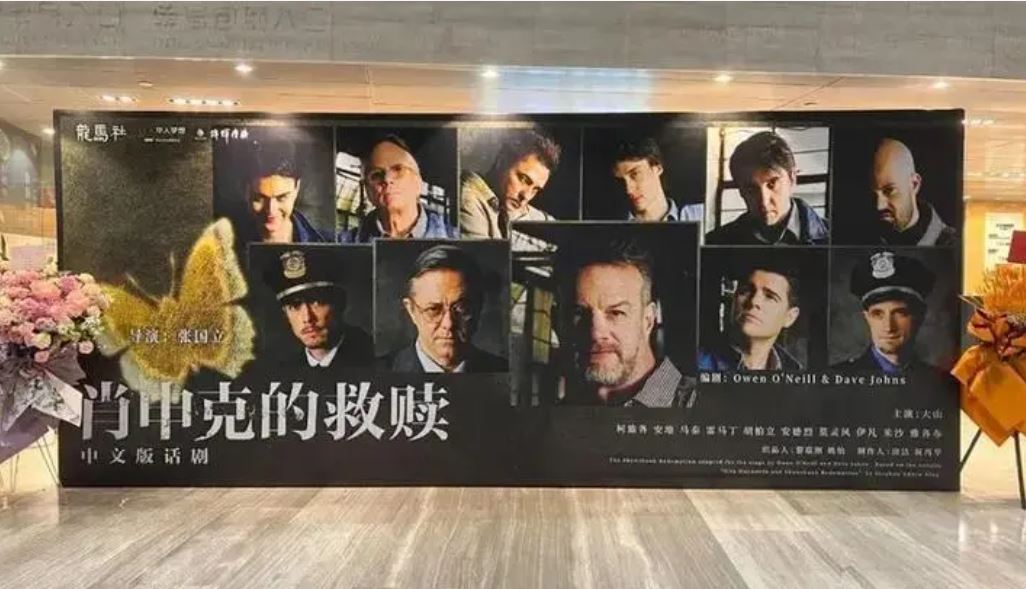Just when you think the U.S. and China can’t get any more confrontational, from trade to tech, from TikTok to Taiwan, something happens that melts your heart: the director Zhang Guoli of China adapted the Shawshank Redemption into a Chinese play with an all-Western cast from eight different countries, including the U.S. The show debuted in January in Shenzhen, has sold out in Shanghai and Beijing, and now is on tour in cities including Chongqing, Wuhan, Xian, and Nanjing.
This American movie has been adapted into a Chinese play shown on Chinese stages, all under an ever-censoring government and an often anti-American state media. Also remarkable is the cast of foreigners speaking fluent Mandarin Chinese. The play is an American story — probably the first anywhere to offer Chinese audiences a new experience of an old movie they loved the first time.
Zhang Guoli, the director and actor, developed a friendship with Tim Robbins (who played Andy Dufresne in the 1994 movie) over the years. The two first met in 2012 while working together on a Chinese movie, 1942, and joined again when Robbins took his performance group of A Midsummer Night’s Dream to Beijing in 2014.
In a letter Zhang posted on his Weibo page, Tim Robbins wrote: “I was so excited when I heard from Guoli that he is adapting the movie to a Chinese language play with a full foreign cast speaking Mandarin. This is such a huge undertaking! … Even if the play’s in Mandarin, I gotta say — from all us actors from across the world — when it comes to performing, language doesn’t stand in the way of reaching people’s hearts… I am so delighted that my reconnection with Guoli after 10 years is through this story we both have passion for.”
“Reaching people’s hearts” is exactly what a good movie is about, especially a movie like the Shawshank Redemption. The production has reached the hearts of people, American or Chinese, with the movie’s moral lesson: Hope.
Andy and his fellow prisoner Red (played by Morgan Freeman in the film) had different ideas about hope. Red: “Let me tell you something, my friend. Hope is a dangerous thing. Hope can drive a man insane.” Andy, however, with his brave, persistent, resourceful, and active hope, won in the end and wrote this to his friend: “But you gotta remember, Red, hope is a good thing, maybe the best of things, and no good thing ever dies.”
Hope is universal, in whatever culture or political system one happens to live. Hope can also be dangerous. It is hope that drove thousands of students to Tiananmen Square in 1989 demanding changes in China. Many of those students died in the bloody government crackdown. It is also hope that sent millions onto arduous journeys from Europe to Ellis Island in New York, from Asia to Angel Island in California, and currently from around the world to the chaotic U.S.-Mexico border. It is really hope that moves the world.
This story of hope has clearly made Chinese theater goers reflect on themselves, as one wrote in this blog on Zhihu: “Shawshank prison is too much like our lives… Most people are like Brooks [the elderly prison librarian, played by James Whitmore] who accepted the institution, a few are like Red who was eventually redeemed, and very few are like Andy who knew what he wanted, acted on it, persisted, and never wavered.”
The director Zhang Guoli was much more upbeat or passionate about the Shawshank Redemption. When asked by a reporter of Southern Weekend about his Chinese play, he said, “Digging in a prison for 27 years is such an incredible story. Its core touches the audience. As reflected in a line in this play, as long as hope is still there, everything is possible. In fact, everyone is a Shawshank prison, so Andy has a saying, as long as we step out of our hearts, we can truly break all the constraints on us.”
Discover more from Post Alley
Subscribe to get the latest posts sent to your email.
